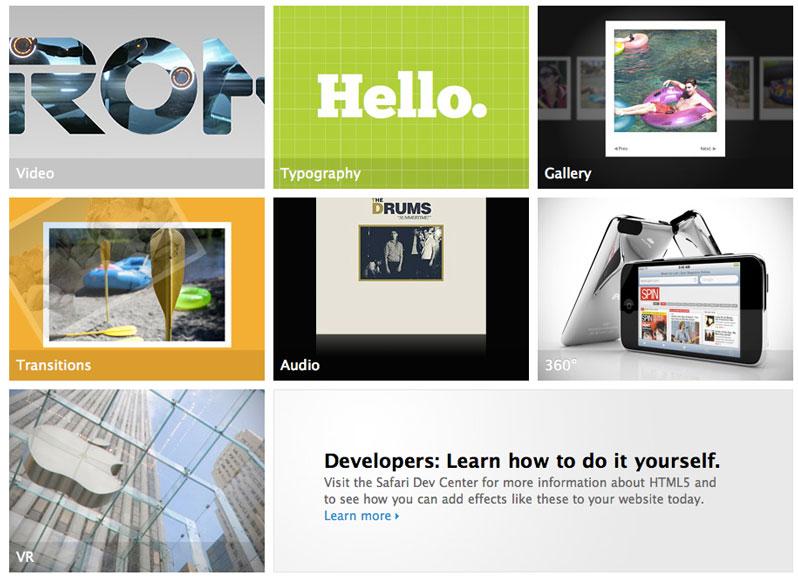Using the Safari browser, users can pan around a 360-degree view of the entrance to Apple's iconic Fifth Avenue store in New York City, watch an embedded trailer for the forthcoming film "Tron" and manipulate scale and perspective, or flip through a gallery of photos. The material is all available at the new apple.com/html5/ site.
"Every new Apple mobile device and every new Mac — along with the latest version of Apple’s Safari web browser — supports web standards including HTML5, CSS3, and JavaScript," the website reads. "These web standards are open, reliable, highly secure, and efficient. They allow web designers and developers to create advanced graphics, typography, animations, and transitions. Standards aren’t add-ons to the web. They are the web. And you can start using them today."
Seven different sections of content highlight the capabilities of HTML5, CSS3 and JavaScript. Apple acknowledges that not all browser offer the support found in Apple's devices, but notes that "soon other modern browsers will take advantage of these same web standards — and the amazing things they enable web designers to do."
The demonstrations also show off the different typography and design flexibility available with HTML5, the ability to embed audio into a website, and manipulate a 360-degree photo of three iPod touches. The site also features a link to the Safari Dev Center, offering more information about HTML5 for developers.
The promotional website also features a link to Apple co-founder Steve Jobs' public letter on Adobe Flash, in which he slammed the Web format as unfit for the modern era. Jobs believes that Flash "falls short" in the world of mobile computing, which is why it is not available on devices powered by the iPhone OS, including the iPhone, iPod touch and iPad.
Jobs and Apple have argued that Flash is a closed system and "100% proprietary." They have instead pushed open standards, including HTML5, CSS and JavaScript. Apple's crusade has helped to influence a number of major sites transitioning to HTML5.
In April, days before the iPad was released, Apple also unveiled a list of sites it declared iPad ready. The sites listed rely on Web standards without Adobe Flash, making them ideal for viewing iPad content. Sites on the list include CNN, Reuters, The New York Times, Major League Baseball, Vimeo, The White House, Virgin America, Flickr, and Sports Illustrated.
 Sam Oliver
Sam Oliver








-m.jpg)






 Charles Martin
Charles Martin

 Malcolm Owen
Malcolm Owen
 William Gallagher
William Gallagher

 Christine McKee
Christine McKee
 Wesley Hilliard
Wesley Hilliard









319 Comments
Now if we could have a Cupertino built html editor...
Well, I guess it's better than a blue Lego block...
Now if we could have a Cupertino built html editor...
Even better, if we could have web site building tools like Freeway Pro that could do all this stuff without coding or hunting around for (and testing) plug-ins and tools that add those abilities.
Hmmm does not work on HTML 5 enabled Chrome or Firefox, when trying to introduce people to HTML 5 as a future replacement for Flash might be best not to force them to download your browser if the one they are currently using already supports HTML 5!
Still, works great on my iPad.
[I cannot download the later version of Saferi required to try this with my old computer.]
Does the tutorial center include actual scripts for each of the modules?
Even better, if we could have web site building tools like Freeway Pro that could do all this stuff without coding or hunting around for (and testing) plug-ins and tools that add those abilities.
That could be something that developers can do -- create the standalone scripts for each module. There are open source CMS, like Joomla, where it has a feature that would then allow to automated installation of these standalone modules.
Maybe the proponents of free source here, who criticize Apple's use of proprietary technology to create what they call "walled garden", instead of simply talking create such open source modules and gift their creations to the public. If I have the skills, experience and training to do these, I would.
Criticism is hollow if all we can do is end with the criticism, and not propose alternatives to what we criticized nor help create those alternatives.
CGC